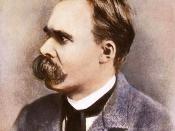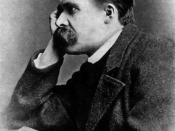An eminent philosopher of the 19th century, Friedrich Nietzsche, who is aggressively an atheist, slams Christianity as deceptive frequently. Nietzsche ends up attacking Christianity entirely to his fullest extent. A few key Platonic elements in Christianity that Nietzsche criticized are: 1) that God is an everlasting, eternal being; 2) that there is a meaningful afterlife; and 3) that the Christian religion purely aims towards sacrificial incentives.
The first point in Christianity that Nietzsche criticizes is that God is an all-powerful, permanent being. Nietzsche (who was ironically the son of a Lutheran pastor) sees the exact opposite. He is renown for his original phrase "God is dead", which was not meant to be taken literally. Instead, Nietzsche's point is that the idea of God is no longer capable of being the basis of a moral code and that there is nothing to live for [1]. Most of the public never agreed with this statement since there are over 2 billion Christians in the world today.
In Thus Spoke Zarathustra (page 68), Nietzsche says what happened is not only the death of God but the death of all the Gods. In other words, all, not just one, morality has died and is to be replaced by the life of the Overhuman, which is said to be a symbol alluding Nietzsche's notion of self-cultivation or self-direction [3]. Nietzsche wants to bring back the life on earth as a glorious reality, a reality found in the body and world, not in the illusion of an eternal, perfect being.
While the Christian favors the transcendent and heavenly afterlife, Nietzsche has the idea of eternal return [2]. Nietzsche proposes a thought-experiment to determine who actually leads their life in a strong and vital way. We are supposed to imagine a life to lead which does...


